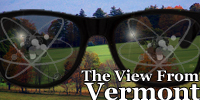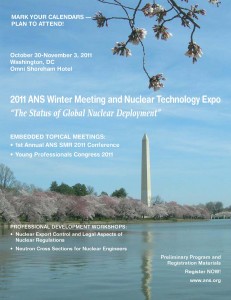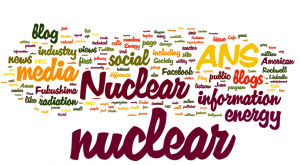NRC terminates Yucca Mountain proceeding
Next stop, federal court!

A message from Schulz Electric
Schulz Electric™ Refurbishes Critical Circulating Water Pump Motor in Only Four Days
Next stop, federal court!
Nothing in life is to be feared. It is only to be understood. ~Marie Curie
 Entergy, the owner of the Vermont Yankee nuclear power plant (VY), has sued the state of Vermont in federal court. At the same time, VY is the subject of a suit against the Nuclear Regulatory Commission, in which intervenors claim that VY does not have a discharge permit required by the Clean Water Act.
Entergy, the owner of the Vermont Yankee nuclear power plant (VY), has sued the state of Vermont in federal court. At the same time, VY is the subject of a suit against the Nuclear Regulatory Commission, in which intervenors claim that VY does not have a discharge permit required by the Clean Water Act.
As part of a Colorado speaking tour, American Nuclear Society President Eric Loewen visited the ANS student section at the Colorado School of Mines (CSM) on Wednesday, August 24. More than 30 students and two faculty members attended his talk, and later that evening 17 students and two faculty members were among the attendees at the Colorado ANS local section meeting.
 It's time to make plans to attend the American Nuclear Society's 2011 Winter Meeting and Nuclear Technology Expo, this year held in Washington, DC, on October 30-November 3 at the Omni Shoreham Hotel.
It's time to make plans to attend the American Nuclear Society's 2011 Winter Meeting and Nuclear Technology Expo, this year held in Washington, DC, on October 30-November 3 at the Omni Shoreham Hotel.
Editor: Dan Yurman
The first two parts of this series (here and here) presented historical trends in electricity generation in California, and the growing use of in-state natural gas and imports of electricity from grids in neighboring states. They also showed that the use of "Unbundled Renewable Energy Credits" could meet the 33 percent renewable portfolio on paper, but may not benefit consumers in California with actual delivery of electricity.
A recent article called "Earthquake, Tsunami, and Nuclear Power in Japan," written by Karen Street has gotten a lot of attention over the past week. It is a well written and comprehensive look at how humanitarian issues interface with energy issues. Shortly after the article was published in Friends Journal, Street was contacted by a personal friend (and long-time nuclear opponent) with the question, "How do I get involved?"
Vermont Yankee's opponents continue their campaign
The American Nuclear Society's Board of Directors on June 30 during the ANS Annual Conference in Hollywood, Fla., approved the creation of three new student sections:
In high school one day I learned that nuclear energy is dangerous to people and the environment. After school that day I confronted my dad, a nuclear engineer, and luckily he was attentive enough to know that I am a visual learner and proceeded to "show" me the ways that nuclear is safe. The whole story can be found here, if you haven't already heard it.
Two British environmental writers who were bitterly opposed to nuclear energy development just a few years ago decided to do some homework. Their questioning attitude and fact seeking minds have led them to the inescapable conclusion that most of the arguments against nuclear energy repeatedly offered by the opposition have been pure fabrications. George Monbiot and Mark Lynas both bring assets to the battle for hearts and minds in the energy source debate that are hard to match - they are recent converts to a pro-nuclear technology position with deep credentials in the environmental community. In addition, they are professional communicators with stories to tell.
In new media and old, time must be devoted to finding and conveying accurate information, no matter how short the news cycle.
The history of the development of peaceful uses of nuclear energy is accentuated by a number of significant emotional events. Some have been distinctly positive; the first man-made self-sustaining fission reaction, the first electricity generated by atomic energy, feats accomplished by the first nuclear powered naval vessels, the invention of life-saving nuclear medicine techniques, etc. During and following each of these milestones our collective understanding of the technology has continued to evolve and mature with increased knowledge and experience.
Perhaps one of the more enduring cartoons that relates to the quality of information on the Internet is the one that states, "On the Internet no one knows you are a dog." It shows a drawing of two dogs sitting in front of a computer terminal. Unfortunately, the cartoon is copyrighted material so it can't be reposted here, but you can see it here along with many variations. The point of the cartoon is that words and images on the screen can come from anywhere and anyone. Clearing up misconceptions and outright falsehoods about nuclear energy since the March 11 Fukushima earthquake and tsunami is getting more attention these days. Problems range from not mainstream journalists not understanding the technical issues to people who are publicity crazed fear mongers out to get their face on a video.
Clearing up misconceptions and outright falsehoods about nuclear energy since the March 11 Fukushima earthquake and tsunami is getting more attention these days. Problems range from not mainstream journalists not understanding the technical issues to people who are publicity crazed fear mongers out to get their face on a video.
The use of food irradiation has expanded globally during the past decade and is gaining renewed momentum as a steadily increasing amount of irradiated food enters commercial channels in the United States and worldwide. Although irradiated fruits, vegetables, and poultry have been available commercially since the early 1990s, the introduction of irradiated ground beef by Huisken Meat Company in Minnesota during 2000 significantly increased awareness and interest in the technology.
In the weeks and months following the events at the Fukushima plant in Japan, the American Nuclear Society's Social Media listserv has become a headquarters for sharing information, ideas, and strategies about how to combat misinformation about nuclear energy. This active forum is facilitated by Dan Yurman, who through this effort has opened a new door for collaboration between communicators from all corners of the nuclear community. Many on this list have voiced concerns that the industry response to Fukushima has not yet managed to transition from defensive to offensive, in terms of public outreach.